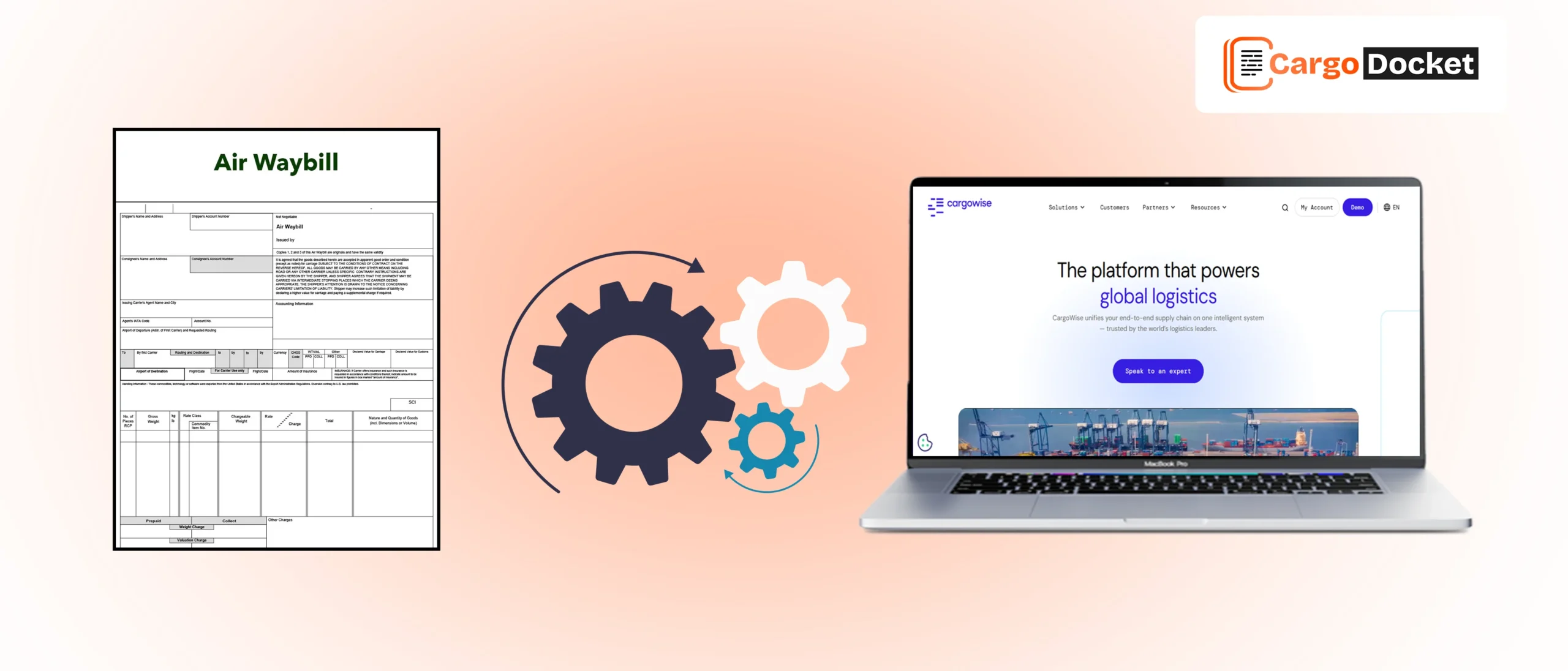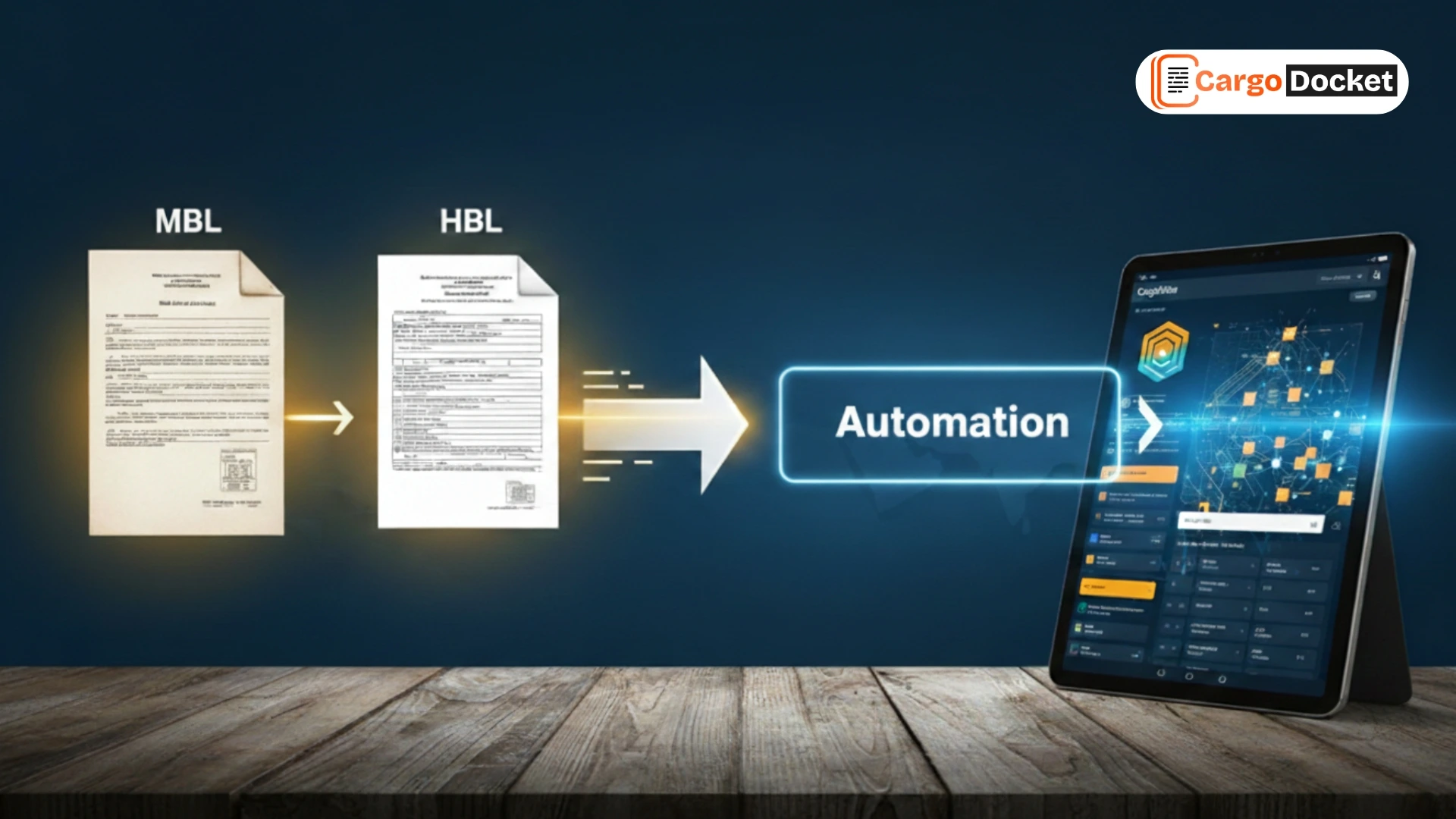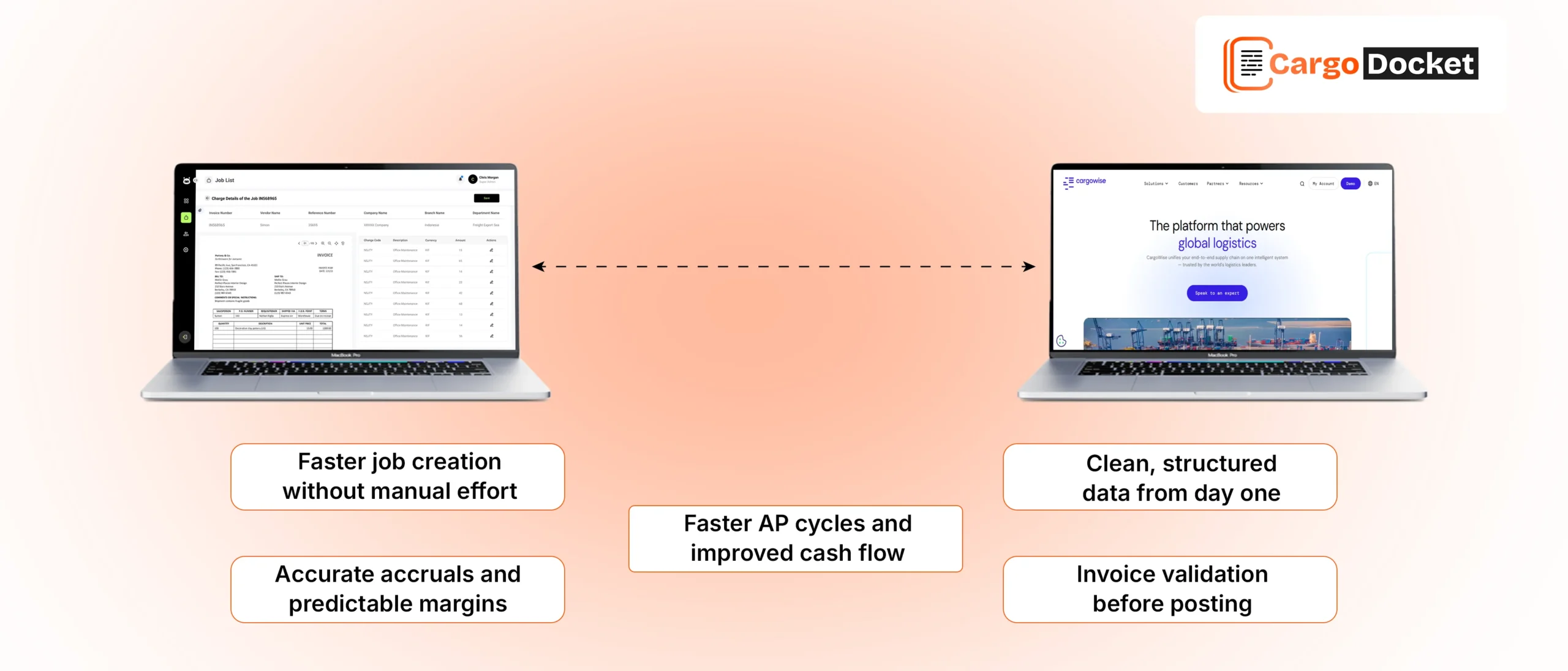Consider this scenario, where your mailbox is overflowing with pre-alert emails, each containing attachments such as Master Bills, House Bills, container information, and consignee details. Every file is opened by your team, which then manually enters the data into CargoWise or other ERPs, verifies fields, compares relevant papers, and hopes nothing was overlooked. Do you recognize this?
In the modern logistics environment, when accuracy, speed, and precision are essential, this manual process is not just out of date. There is congestion.
Because of this, more progressive freight businesses are using Imports Bill of Lading (BoL) Automation, particularly Cargo Docket, which effortlessly integrates with CargoWise Next.
So what makes BoL automation so impactful? Why is traditional processing no longer enough? Let’s explore.
Understanding Import Bill of Lading Automation
An Import Bill of Lading (BoL) contains critical shipment data, from MBL and HBL numbers to container IDs, carrier names, consignee and notify parties, and voyage details. These documents serve as the backbone for creating import jobs and consoles in CargoWise.
However, over 80% of logistics companies still handle BoL processing manually. That means:
- Sorting through pre-alert emails
- Downloading and reading PDFs
- Manually keying over 20 fields per shipment into CargoWise
- Validating entries against master data
- Chasing down missing documents
This isn’t just time-consuming. It’s error-prone, expensive, and hard to scale. One small typo in an MBL can delay customs clearance. One missed HBL can disrupt tracking and invoicing.
BoL automation removes this burden. It extracts, validates, groups, and posts BoL data directly into CargoWise, without relying on templates or manual input.
How Does Cargo Docket Automate BoL Processing for CargoWise Users?
Cargo Docket was purpose-built for freight forwarders using CargoWise. Its BoL automation engine works in the background to turn unstructured documents into structured, validated data, automatically.
Here’s how the process flows:
1. Document Collection from Pre-Alert Emails
Cargo Docket scans your email inbox or shared folder, fetching attachments like scanned PDFs, image files, and Excel docs. Whether it’s a single-page or multi-page, standard or custom format, it gets picked up.
2. Advanced Data Extraction
Using modern AI-driven document processing, Cargo Docket extracts over 24 critical data points from each document, including:
- MBL and HBL numbers
- Container and seal numbers
- Carrier and shipper names
- Consignee and notify party details
- Port of loading and discharge
- ETAs, vessel names, voyage numbers
No templates are required. No zoning rules. Just clean data.
3. Intelligent Grouping of MBLs and HBLs
Cargo Docket automatically links House Bills to the correct Master Bill, validates their relationship, and ensures they’re bundled correctly before posting, so nothing slips through the cracks.
4. Real-Time Job Creation in CargoWise Next
Once the documents are validated, Cargo Docket pushes the data into CargoWise. Import jobs and consoles are created or updated instantly, with accurate mapping to branches, clients, and shipment types.
5. Exception Management and Human Review
Missing or inconsistent data? Cargo Docket flags it in the exception manager, allowing your team to review, edit, comment, and collaborate, all in one place.
What Makes This Better Than OCR or Manual Methods?
You might be wondering, can’t OCR tools already do this? Yes and no.
Basic OCR tools can extract text, but they fall short when documents aren’t uniform. They:
- Depend on rigid templates
- Struggle with multi-document grouping
- Require human oversight for accuracy
- Can’t validate data against CargoWise master records
Cargo Docket AI solves these challenges with AI-powered document intelligence. That means:
- No need to maintain templates
- Grouping logic that understands MBL/HBL relationships
- Auto-validation against your ERP data
- Streamlined exception workflows
In short: less effort, more accuracy, and fewer manual touchpoints.
What are the Key Benefits of BoL Automation for Freight Forwarders?
The impact of automation on your operations is immediate and measurable:
1. Faster Turnaround Times
With job creation automated, your operations team can process shipments in minutes instead of hours, reducing delays and meeting tight SLA windows.
2. Improved Data Accuracy
Automation eliminates manual keying errors and ensures fields like container numbers, consignee names, and voyage details are extracted and validated properly.
3. Proactive Exception Handling
Documents that are incomplete or inconsistent are flagged early, so your team can resolve issues before they cause downstream problems.
4. Smooth Integration with CargoWise
Cargo Docket’s native integration ensures real-time updates into CargoWise, with no need for double entry or data exports.
5. More Time for High-Value Work
With document handling offloaded, your team can focus on customer service, carrier coordination, and strategic operations.
6. Scalability Without Extra Headcount
As volumes grow, automation handles the extra load without hiring more staff, giving you better margins and a scalable backend.
Why is Cargo Docket AI the Right Fit for CargoWise Users?
Unlike generic automation tools, Cargo Docket AI is built for the freight industry and designed to align directly with CargoWise workflows.
Core Features:
- Direct document upload to CargoWise eDocs
- Auto-posting of import jobs and consoles
- User and team permissions for exception resolution
- Multi-language, multi-format support
- Support for scanned PDFs, Excel, images, and emails
- Full visibility and audit trails
Whether you’re dealing with 50 shipments a week or 5,000, Cargo Docket AI grows with your business and integrates smoothly with your current CargoWise setup.
Conclusion
Although bills of lading won’t go away, our approach to handling them should.
In an industry where every delay matters and every error costs money, automating BoL handling is no longer optional, it’s essential. Cargo Docket’s BoL automation for CargoWise users helps freight forwarders simplify their import processes, reduce errors, and stay ahead in an increasingly competitive market.
Ready to cut your BoL processing time by 85%? Book a demo with Cargo Docket AI today and see how easy it is to transform your import workflows, create jobs faster, and let your team focus on what moves your business forward.
Because precision and speed are not merely desirable qualities in freight forwarding, they are essential.





